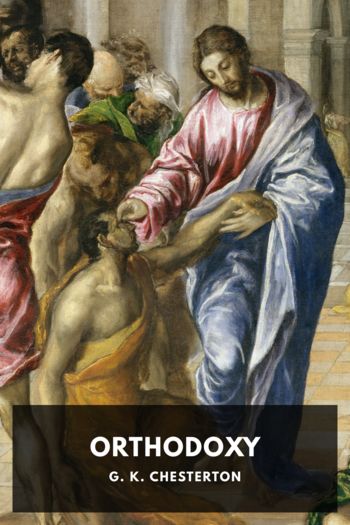Orthodoxy - G. K. Chesterton (literature books to read .txt) 📗

- Author: G. K. Chesterton
Book online «Orthodoxy - G. K. Chesterton (literature books to read .txt) 📗». Author G. K. Chesterton
This, then, is our second requirement for the ideal of progress. First, it must be fixed; second, it must be composite. It must not (if it is to satisfy our souls) be the mere victory of some one thing swallowing up everything else, love or pride or peace or adventure; it must be a definite picture composed of these elements in their best proportion and relation. I am not concerned at this moment to deny that some such good culmination may be, by the constitution of things, reserved for the human race. I only point out that if this composite happiness is fixed for us it must be fixed by some mind; for only a mind can place the exact proportions of a composite happiness. If the beatification of the world is a mere work of nature, then it must be as simple as the freezing of the world, or the burning up of the world. But if the beatification of the world is not a work of nature but a work of art, then it involves an artist. And here again my contemplation was cloven by the ancient voice which said, “I could have told you all this a long time ago. If there is any certain progress it can only be my kind of progress, the progress towards a complete city of virtues and dominations where righteousness and peace contrive to kiss each other. An impersonal force might be leading you to a wilderness of perfect flatness or a peak of perfect height. But only a personal God can possibly be leading you (if, indeed, you are being led) to a city with just streets and architectural proportions, a city in which each of you can contribute exactly the right amount of your own colour to the many-coloured coat of Joseph.”
Twice again, therefore, Christianity had come in with the exact answer that I required. I had said, “The ideal must be fixed,” and the Church had answered, “Mine is literally fixed, for it existed before anything else.” I said secondly, “It must be artistically combined, like a picture”; and the Church answered, “Mine is quite literally a picture, for I know who painted it.” Then I went on to the third thing, which, as it seemed to me, was needed for an Utopia or goal of progress. And of all the three it is infinitely the hardest to express. Perhaps it might be put thus: that we need watchfulness even in Utopia, lest we fall from Utopia as we fell from Eden.
We have remarked that one reason offered for being a progressive is that things naturally tend to grow better. But the only real reason for being a progressive is that things naturally tend to grow worse. The corruption in things is not only the best argument for being progressive; it is also the only argument against being conservative. The conservative theory would really be quite sweeping and unanswerable if it were not for this one fact. But all conservatism is based upon the idea that if you leave things alone you leave them as they are. But you do not. If you leave a thing alone you leave it to a torrent of change. If you leave a white post alone it will soon be a black post. If you particularly want it to be white you must be always painting it again; that is, you must be always having a revolution. Briefly, if you want the old white post you must have a new white post. But this which is true even of inanimate things is in a quite special and terrible sense true of all human things. An almost unnatural vigilance is really required of the citizen because of the horrible rapidity with which human institutions grow old. It is the custom in passing romance and journalism to talk of men suffering under old tyrannies. But, as a fact, men have almost always suffered under new tyrannies; under tyrannies that had been public liberties hardly twenty years before. Thus England went mad with joy over the patriotic monarchy of Elizabeth; and then (almost immediately afterwards) went mad with rage in the trap of the tyranny of Charles the First. So, again, in France the monarchy became intolerable, not just after it had been tolerated, but just after it had been adored. The son of Louis the well-beloved was Louis the guillotined. So in the same way in England in the nineteenth century the Radical manufacturer was entirely trusted as a mere tribune of the people, until suddenly we heard the cry of the Socialist that he was a tyrant eating the people like bread. So again, we have almost up to the last instant trusted the newspapers as organs of public opinion. Just recently some of us have seen (not slowly, but with a start) that they are obviously nothing of the kind. They are, by the nature of the case, the hobbies of a few rich men. We have not any need to rebel against antiquity; we have to rebel against novelty. It is the new rulers, the capitalist or the editor, who really hold up the modern world. There is no fear that a modern king will attempt to





Comments (0)